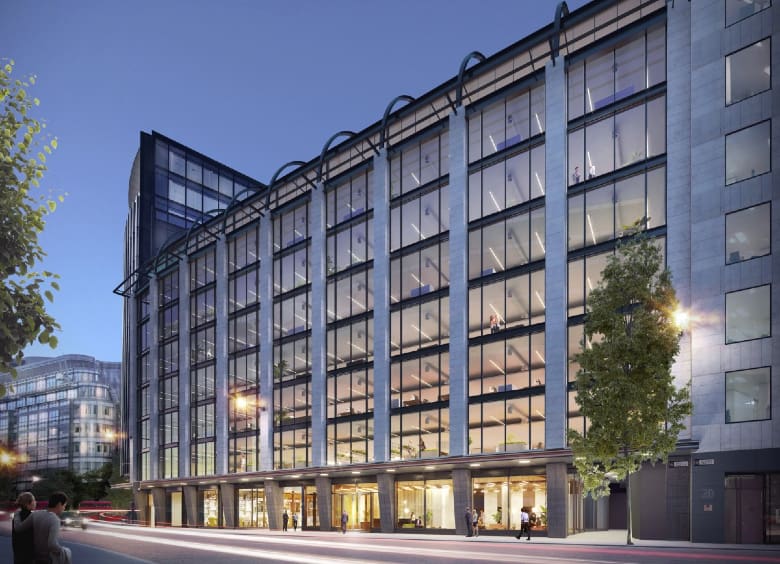
66 Shoe Lane in the City of London
Hongkongers’ love affair with London real estate shows no sign of cooling, as seen by some well-known names banding together to buy a fully leased office building in the main business district.
HKEX-listed Wing Tai Properties on Sunday announced the formation of a joint venture with Champion REIT, Macau casino operator Francis Lui and Tung Chee-chen, the brother of former Hong Kong chief executive Tung Chee-hwa, to purchase the 11-storey building at 66 Shoe Lane for £258 million ($360.8 million).
Formerly known as Athene Place, the mid-rise property on the western edge of the City of London has 157,658 square feet (14,647 square metres) of net internal area, including 153,462 square feet of office space and 4,196 square feet for retail. The consortium is paying about £1,636 ($2,290) per square foot of built area.
In a filing with the Hong Kong stock exchange, Wing Tai said the venture created last Friday provides an opportunity for the developer “to expand and diversify its property investment portfolio and generate a steady flow of rental income”.
Elite Investment Team
Under the terms of the joint venture, Wing Tai and Sparkle Delight — a holding company controlled by Lui, the deputy chairman of gaming group Galaxy Entertainment — will each own 21 percent. Champion REIT will own 27 percent, and the remaining 31 percent will be owned by Top Paramount, a holding company controlled by Tung Chee-chen, the former chairman and CEO of his family’s shipping firm, Orient Overseas.

Tung Chee-chen, younger brother of Tung Chee-hwa, is investing a chunk of the family fortune in the City of London
The acquisition bands together some of Hong Kong’s wealthiest families, with Francis Lui’s father, Lui Che-woo, who founded Galaxy and developer K Wah International, worth an estimated $19.2 billion, according to Forbes. Tung Chee-chen is estimated to have assets of $3.4 billion, while Great Eagle chairman Lo Ka-shui, whose company sponsors Champion REIT, is said to have a fortune of $1.1 billion. Wing Tai chairman Cheng Wai Keung is still aspiring to his first billion, with a net worth of $705 million, according to Forbes.
The sellers of the property are HPREF Athene Holding SARL and Henderson Park Real Estate Fund I Finance Master Ltd. The office portion of the building is fully leased by professional services firm Deloitte until September 2035, with a renewal option.
For Champion REIT, the slice of 66 Shoe Lane marks the HKEX-listed trust’s first asset outside of Hong Kong. Existing holdings for the REIT are Three Garden Road, a two-tower commercial complex in Central; and the Langham Place office tower and Langham Place mall in Mong Kok. Assets in the REIT totalled over HK$83 billion ($10.7 billion) as of 31 December 2019.
The trust’s manager describes the vicinity of 66 Shoe Lane as an up-and-coming area near the future Farringdon commuter rail station and part of an “emerging headquarters cluster” with high-profile neighbours Amazon and Goldman Sachs. Champion expects an entry yield from the asset of more than 4 percent.
Hot in the City
Well-heeled Hong Kong investors have beaten a path to the City of London to fill a desire for secure, income-producing commercial assets.
The business district’s planning authority announced in mid-February that Hong Kong-based developer Tenacity had been granted permission to redevelop 70 Gracechurch Street into a new 812,675 square foot commercial complex. The news came less than a month after Tenacity, run by a scion of Dah Sing Bank’s founding family, got the go-ahead to develop a 30-storey office tower at 55 Gracechurch Street, less than a minute’s walk away.
In March 2017, Hong Kong-listed CC Land agreed to buy the 610,000 square foot Leadenhall Building, nicknamed the Cheesegrater, for £1.15 billion. Later that year, oyster sauce maker Lee Kum Kee Group bought 20 Fenchurch Street, aka the Walkie Talkie, for £1.3 billion, in what was then the highest price ever paid for a single commercial building in the British capital.
At the time of Tenacity’s 70 Gracechurch purchase in 2017, CEO Patrick Wong told the South China Morning Post that stable rental income, the rule of law and cheaper money were driving investment in London real estate by Hongkongers. The trend seems likely to intensify as multinational companies retreat from the SAR’s office market.
Leave a Reply